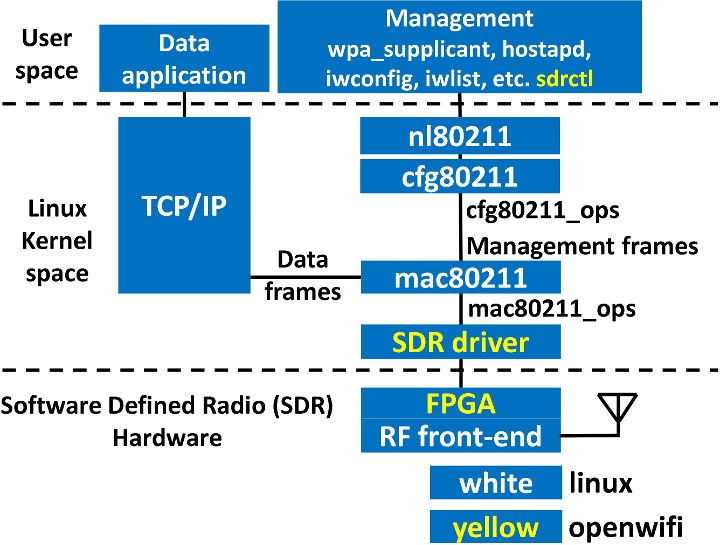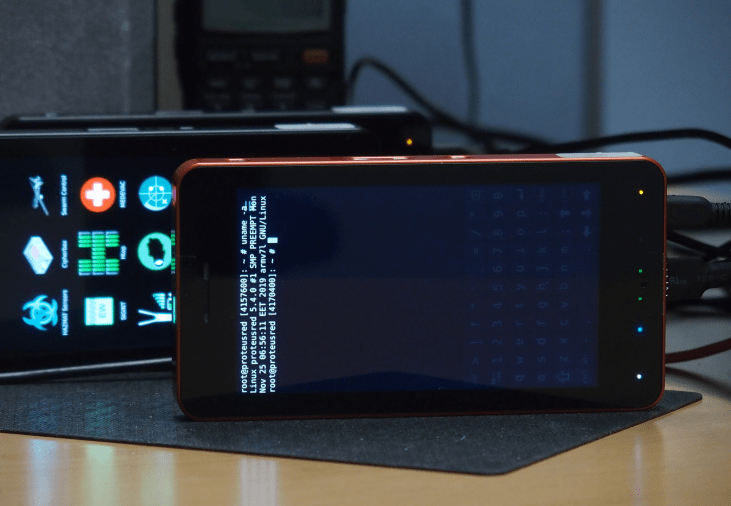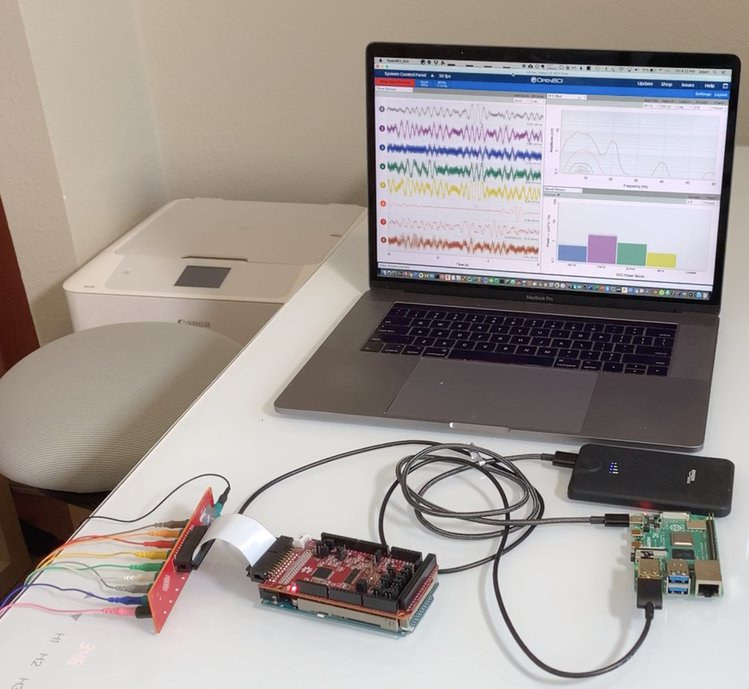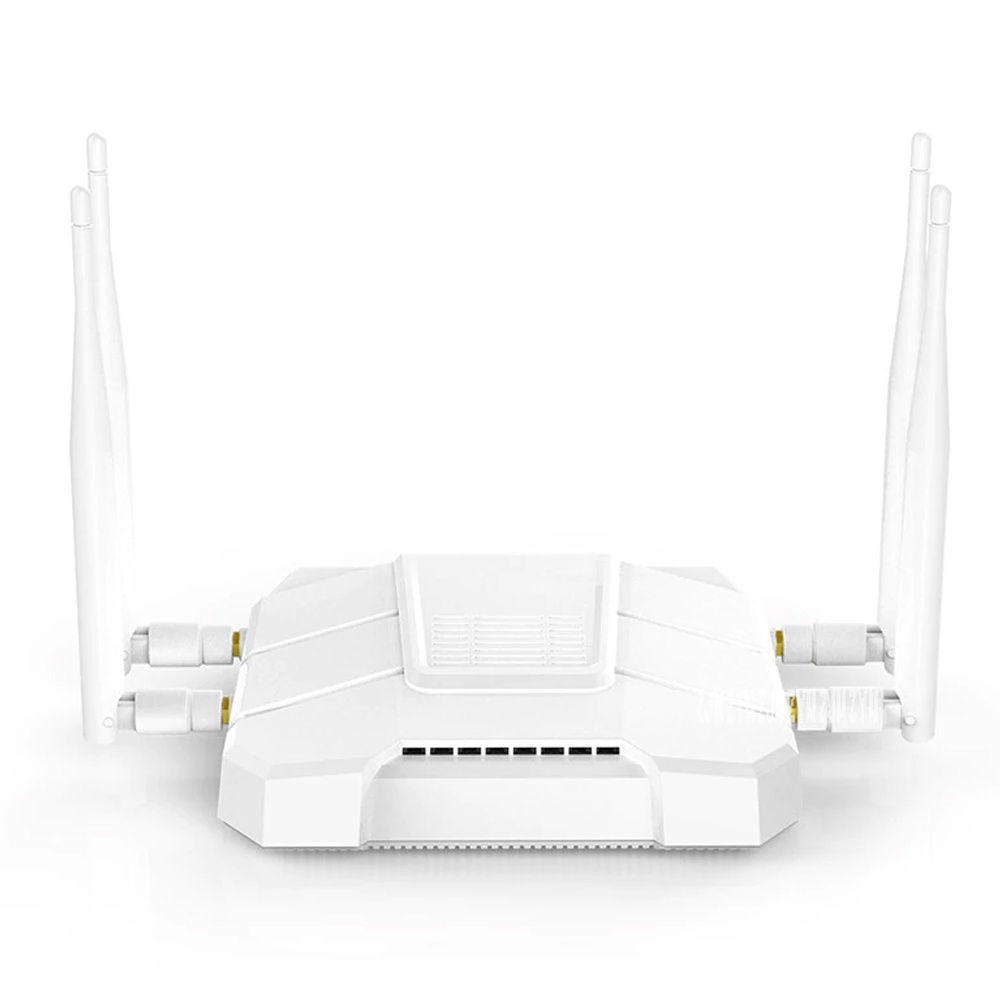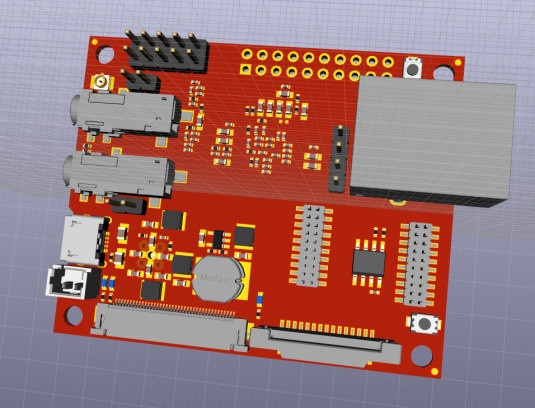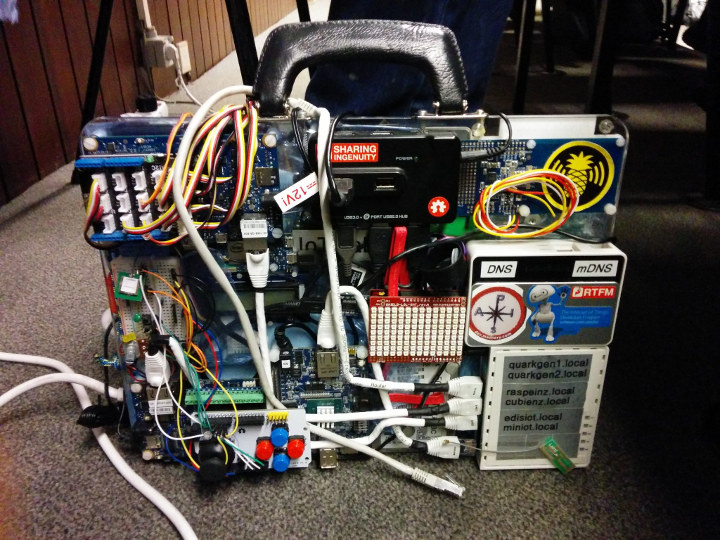WiFi is omnipresent on most connected hardware, and when it works it’s great, but when there are issues oftentimes they can not be solved because the firmware is a closed-source binary. I understand companies do that either to protect their IP and/or make sure end-users do not break FCC compliance. OpenWiFi project aims to deliver a completely open-source SDR (Software Defined Radio) WiFi implementation compatible with Linux and running on FPGA hardware. OpenWiFi currently supported features: 802.11a/g; 802.11n MCS 0~7; 20MHz Mode tested: Ad-hoc; Station; AP DCF (CSMA/CA) low MAC layer in FPGA Configurable channel access priority parameters: duration of RTS/CTS, CTS-to-self SIFS/DIFS/xIFS/slot-time/CW/etc Time slicing based on MAC address Easy to change bandwidth and frequency: 2MHz for 802.11ah in sub-GHz 10MHz for 802.11p/vehicle in 5.9GHz The developers tested OpenWiFi on Xilinx ZC706 FPGA evaluation kit coupled Analog Devices fmcomms2/fmcomms4 RF board to form an access point, and connected it to […]
ProteusDevice Secure, Open-Source Linux Handheld Features Ethernet Connectivity
ProteusDevice XXLSEC Ltd., the developer of the Privecall-TX device, has developed a near-identical, slightly bigger ProteusDevice, which runs the Linux 5.4 based PriveOS. The ProteusDevice handheld device (“not a mobile phone”) is said to have very tight security and was developed with secure access in mind. Background and Linux Handheld Market The market is seeing more Linux handheld and phones such as the Purism Librem 5, the PinePhone “Braveheart” both of which are already in mass production. There are also other computing options with the handheld Pocket Popcorn Computer, which is much like the PocketChip, but decidedly improved and faster in general, as well as the Solectrix SX Mobile Device Kit which is more of a business option, for smartphone, opensource development with no cellular connectivity, but Gigabit Ethernet and USB-to-UART ports. Some Features and Mystery Production The ProteusDevice is in good company, and has a solid start, but is […]
HackEEG Arduino Shield Reads Signals from Your Brain (EEG), Muscles (EMG), and Heart (EKG)
Biosignals are signals from living beings that can be continually measured & monitored, and some common methods to measure those biosignals include electroencephalogram (EEG) to monitor the electrical activity in your brain, electromyography (EMG) for recording the electrical activity produced by skeletal muscles, and electrocardiogram (EKG or ECG) to measure electrical activity of your heartbeat. Those can be used for brain interfaces which according to a recent Ericsson’s report may become commonplace by 2030 with users just thinking about commands, prosthetic arms, health and disease monitoring, and so on. Starcat has designed the HackEEG shield to experiment with all those three methods using an Arduino board and electrodes. HackEEG features and specifications: TI ADS1299 8-Channel, 24-Bit ADC for biopotential measurements SPI EEPROM for storing configuration data 8x analog-digital conversion (ADC) channels, each with a 24x programmable-gain amplifier (PGA). Up to 4x shields can be stacked on one Arduino Due for […]
FreeMesh WiFi 5 Mesh Network Router Runs OpenWrt
FreeMesh W1326 LTE Router Mesh Network Access FreeMesh has launched an open-source mesh router, the WE1326 LTE FreeMesh Router (included are two nodes) that runs OpenWrt open-source operating system. Open Source and “Hackable” Mesh System FreeMesh enters the mesh market with source code posted on Gitlab, a user-hackable/customizable mesh in other words. FreeMesh uses OpenWrt – the OpenWrt project is a Linux operating system aimed at embedded systems. The focus is on removing the need for a static firmware, where there is only one option for software for the hardware being purchased. The Offerings and Markets The company is targeting the residential market, where most mesh systems are almost double the $150.00 price tag of the FreeMesh. It is reported that there are other ZBT WE826-WD based mesh routers on the market, check out the LinuxGizmos.com article for more information. FreeMesh Specifications FreeMesh Router CPU Dual Core 880MHz MediaTek MT7621AT ROM SPI […]
Marlin 2.0 Open Source 3D Printer Firmware Finally Released
Back in June, we wrote about Marlin 2.0 firmware supporting ESP32 3D printer board, but at the time the firmware was still in RC1 (Release Candidate) phase. I was informed Marlin 2.0 firmware had been in beta for several years now, but the good news is that Marlin 2.0.0 open-source 3D printer firmware has now been officially released. Some of Marlin 2.0.0 new features include: 32-bit support with several boards including Arduino DUE (SAM3X8E), Adafruit Grand Central (SAM5D), Smoothie / SBASE / EZBoard based on NXP LPC176x, SKR Mini powered by STM32, as well as ESP32 boards Some improvements were made to some AVR boards including Melzi (ATmega 1280), RAMPS (ATmega 2560), and RAMBo / miniRAMBo / Einsy RAMBo boards PlatformIO build environments for supported boards VSCode “Auto Build Marlin” extension for one-click build Power-Loss Recovery for SD print jobs Magnetic Parking Extruder support Magnetic Switching Toolhead and Toolchanger support […]
Pantahub Enables Seamless, Remote Linux Firmware Updates Over-the-Air
Let’s say you’re running Raspbian on your Raspberry Pi 4 board, but would like to check out the latest Ubuntu 19.10 for the board. What would you normally have to do? After downloading the firmware and turning off your Raspberry Pi 4, you’d normally need physical access to your Raspberry Pi 4 to remove the MicroSD card, insert it into your computer and start balenaEtcher or other utility to flash the image. Once it’s done remove the MicroSD card from your PC and insert it back into the Raspberry Pi SBC, before booting it up. That’s fine for experimentation, but time-consuming if you had to do this for multiple boards that may be placed in various locations. That’s where Pantacor’s PantaHub, PantaVisor, and PVR utility come in. Pantahub is a web dashboard used for registration, to monitor your devices, and documentation, Pantavisor is an Alpine Linux based device init system […]
Olimex OSHW Allwinner S3 IP Camera Board in the Works – Feedback & Suggestions Welcomed
Allwinner S3 Arm Cortex-A7 processor is designed for dual-camera systems and embeds 128MB RAM. It looks to be an evolution of the older Allwinner V3s chip that came with 64MB RAM and is software-compatible with the older camera SoC. We reported about the new processor and an Allwinner S3 development board last year, but Olimex has started working on an open-source hardware IP camera board based on the processor and is asking for feedback from customers and the community at large. Preliminary specifications: SoC – Allwinner S3 Cortex-A7 @ 1.2GHz with 128MB DDR3 RAM at 1333 MHz Storage -MicroSD card slot, configuration EEPROM, optional NAND/eMMC/SPI Flash on socket Camera I/F MIPI camera connector with RPi pinout Parallel CSI camera connector Display – LCD connector for LCD-OLinuXino 4.3″ to 15.6″ displays Audio – Audio in and out via 3.5mm audio jacks Connectivity Fast Ethernet with PoE option WiFi / BT module with […]
FOSDEM 2020 IoT Devroom Call for Proposals
FOSDEM (Free & Open-source Software Developers’ European Meeting) takes place every year in Brussels, Belgium on the first weekend of February. FOSDEM 2020 is scheduled for February 1-2, and now that developer rooms have already been announced, there are calls for proposals for each topic. Benjamin Henrion (aka Zoobab), a frequent reader and commenter of CNX Software, will be in charge of the IoT devroom and has now initiated a call for proposals for Internet of Things talks. The devroom will take place on Saturday or Sunday between around 10.30 and 18:00. Each talk will last 25 minutes with a 5-minute break between talks. The talks must be about fully open source projects that cover one of the topics below: Machine-to-machine (M2M) communication on small embedded devices Distributed applications in any field of interest for autonomous/self-controlled devices, (e.g. domotics, automotive, etc) Networking: TCP/IP, mesh networking, message queuing, cross-layer solutions Real-life […]


